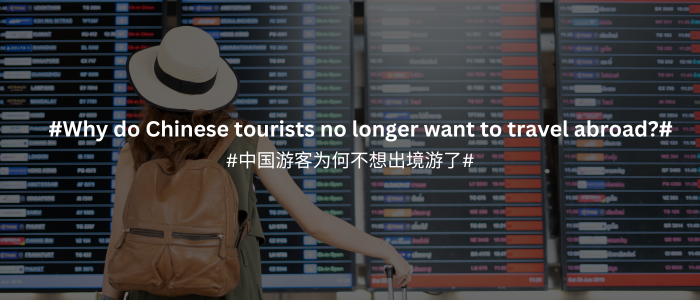To know more about the Chinese Tourists’ Behavior, contact us at dx@daxueconsulting.com
The number of Chinese tourists has increased significantly in recent years and is projected to climb to 174 million by 2019. These travellers are expected to spend approximately $260 billion annually, which is roughly equivalent to the GDP of a developed country like Singapore. In this article, we will discuss who these travellers are, and how to attract them to your country.
Who are the Chinese Tourists?
Most of the Chinese tourists are Chinese millennials, and they constitute 40% of China’s outbound travels. The average Chinese millennial has been to 13 countries and travelled abroad 3.3 times for leisure in the past year alone for an average of 25 days. Wealthy post-70s and wealthy basically constitute the remainder.
What should you do to attract these Chinese tourists to your country?
What should you do to attract Chinese millennials to your country?
When marketing to Chinese millennials it is advisable to regard them as “travellers” rather than “tourists”, as they prefer to respond to opportunities and plan their own customised trips. Chinese millennials mostly travel for the purposes of leisure or exploring the world. They are increasingly attracted to cultures that differ significantly from Chinese culture, albeit Asian cultures. Countries such as South Korea, Japan, Thailand, and Indonesia have experienced a significant increase of Chinese millennial tourism in recent years.
Marketers believe this stems from the influence of foreign Asian culture on China. For instance, K-Pop and T-pop (South Korean and Thai pop culture, respectively) fever are attracting Chinese millennials abroad. Hence in order to attract Chinese tourists to your country, you should link the destination to the aspects of Chinese popular culture that has been significantly influenced by said country. For instance, South Korean dramas are very popular amongst the younger generation of Chinese. Leveraging a South Korean travel destination as the place in which a popular Korean TV-drama takes place may influence Chinese millennials to go there.
The above suggestion is also consistent with how to market to millennials in general, as direct marketing is likely to be ineffective. There is wide agreement amongst marketers that integrating your offering into Chinese popular culture is the best way to communicate your offering to the millennials. This also applies for tourism. Hence buying the right to include images of famous foreign celebrities from films and TV-shows that Chinese millennials frequently watch, may serve as a bridge between Chinese popular culture and your offering.
When targeting Chinese millennials who are hungry for Western culture, it is important to note that this group is a niche segment within Chinese millennials, as most Chinese millennials prefer to visit other Asian countries, particularly East-Asian and South-East Asian countries. Hence when marketing to this niche segment, it is important to leverage the “foreignness” and portray Western culture as something exotic.
What should you do to attract wealthy post-70s and wealthy retirees to your country?
 There has been a recent trend in Chinese tourism with respect to the older generations. A growing number of seniors are willing to book expensive trips abroad after being inspired by photos, movies, or magazines. Indeed, travel is now one the main source of leisure and entertainment for the luxury segment of the market. This group constitutes approximately 20% of China’s outbound travellers. According to China’s biggest travel agency, Ctrip (In Chinese: 携程), about 87 percent of people older than 50 express a strong urge to travel, while the rest say they definitely plan to. With respect to what marketing platforms they use, the older generations are catching up with the times, as more and more of them are booking trips online. According to Tuniu (In Chinese:途牛), one of China’s biggest online travel agencies, the number of tourists older than 60 who booked trips through Tuniu grew by 252 percent in 2015 over the previous year. Nearly 30 percent of these have travelled more than three times, and about 85 percent have opted for group travel, says Tuniu’s publicity manager Sun Libin.
There has been a recent trend in Chinese tourism with respect to the older generations. A growing number of seniors are willing to book expensive trips abroad after being inspired by photos, movies, or magazines. Indeed, travel is now one the main source of leisure and entertainment for the luxury segment of the market. This group constitutes approximately 20% of China’s outbound travellers. According to China’s biggest travel agency, Ctrip (In Chinese: 携程), about 87 percent of people older than 50 express a strong urge to travel, while the rest say they definitely plan to. With respect to what marketing platforms they use, the older generations are catching up with the times, as more and more of them are booking trips online. According to Tuniu (In Chinese:途牛), one of China’s biggest online travel agencies, the number of tourists older than 60 who booked trips through Tuniu grew by 252 percent in 2015 over the previous year. Nearly 30 percent of these have travelled more than three times, and about 85 percent have opted for group travel, says Tuniu’s publicity manager Sun Libin.
The older generations are more attracted to Western travel destinations than millennials because of their perception of the West as solely consisting of developed and rich nations. Hence it is likely to be easier to leverage Western travel destinations than Asian destinations when marketing to China’s older generations, which have the opposite travel inclinations of the younger generations. It is advisable to leverage the luxury aspect when marketing to the older and wealthier Chinese segment of outbound tourism, as it is only the wealthy that both desire and that can afford to travel to the West.
In conclusion, when seeking to attract Chinese tourists abroad you should differentiate between the younger and older generations. When marketing to the younger generation, integrating your offering with popular culture is likely to be more effective. For this reason, millennials are more likely to be attracted to Asian travel destinations. When marketing to the older and wealthier segment of Chinese tourists, you should leverage wealth and luxury when trying to attract these tourists abroad. In this regard, Western travel destinations are likely to be more attractive for this segment.
Follow us on Twitter to see our latest post:
How much time do the #Chinese spend on #leisure activities? Check our latest study https://t.co/MEcFu2w0En #China pic.twitter.com/ZWImbhlqCt
— Daxue Consulting (@DaxueConsulting) November 18, 2015





